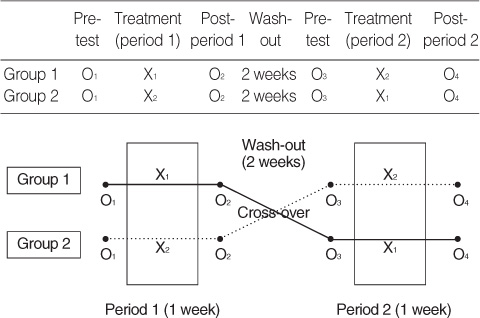J Korean Acad Nurs.
2009 Jun;39(3):357-365. 10.4040/jkan.2009.39.3.357.
The Effects of Aromatherapy on Stress and Stress Responses in Adolescents
- Affiliations
-
- 1Department of Nursing, Youngnam Foreign Language College, Gyeongsan, Korea. marseo@hanmail.net
- KMID: 999305
- DOI: http://doi.org/10.4040/jkan.2009.39.3.357
Abstract
-
PURPOSE: This study was done to examine the effects of aromatherapy on stress and stress responses in adolescents.
METHODS
A two-group cross-over design was used for this study. The experimental treatment was aroma essential oil inhalation and the placebo treatment was carrier oil inhalation using a necklace. The sample included 36 female high school students. Fisher's exact test, t-test, and paired t-test using SPSS/WIN program were used to analyze the data.
RESULTS
Stress levels were significantly lower when the students received the aroma treatment compared to when they received the placebo treatment. The stress responses except salivary IgA levels were significantly lower when the students received the aroma treatment.
CONCLUSION
Aroma inhalation could be a very effective stress management method for high school students. Therefore, it is recommended that this program be used in clinical practice as an effective nursing intervention for high school students
Keyword
MeSH Terms
Figure
Cited by 1 articles
-
Boarding High School Students' Life Stress and Coping Skills
Kwisoon Choe, Sung Bok Kwon, Hye Gyeong Cha
J Korean Acad Psychiatr Ment Health Nurs. 2011;20(1):25-36. doi: 10.12934/jkpmhn.2011.20.1.25.
Reference
-
1. Byeon YJ. A study of the relations between parents' rearing attitude, irrational beliefs and stress of adolescents. 1995. Seoul: Yonsei University;Unpublished master's thesis.2. Deinzer R, Schuller N. Dynamics of stress-related decrease of salivary immunoglobulin A (sIgA): Relationship to symptoms of the common cold and studying behavior. Behavioral Medicine. 1998. 23:161–169.3. Han SH. Effects of aromatherapy on headache, stress and immune response of students with tension-type headache. 2002. Seoul: The Catholic University of Korea;Unpublished doctoral dissertation.4. Han SS, Lee SC. SPSS Nursing · Health Statistical Analysis. 2006. Seoul: Hyunmoonsa.5. Hwang JH. The effect of the inhalation method using essential oils on blood pressure and stress responses of clients with essential hypertension. Journal of Korean Academy of Nursing. 2006. 36:1123–1134.6. Ju KY. The effect of aromatherapy on psychological stress and stress hormones in blood after maximal exercise. 2002. Seoul: Kookmin University;Unpublished master's thesis.7. Kim JS. A Study on stress, anxiety, mental health in high school students. 2001. Daejeon: Chungnam National University;Unpublished master's thesis.8. Kim JT, Shin DK. A study based on the standardization of the STAI for Korea. The New Medicine Journal. 1979. 21(11):69–75.9. Kim KS. Effects of aromatherapy on psychological and physiological responses in the middle aged women. 2003. Seoul: Yonsei University;Unpublished doctoral dissertation.10. Kirschbaum C. Salivary cortisol technical issues. 2008. Retrieved September 17, 2008. from http://www.macses.ucsf.edu/Research/Allostatic/notebook/FAQs-salivcort.pdf.11. Ko HM. Relation of anxiety, stress perception and academic achievement. 1998. Gwangju: Chonnam National University;Unpublished master's thesis.12. Ko MJ, Yu SJ, Kim YG. The effects of solutionfocused group counseling on the stress response and coping strategies in the delinquent juveniles. Journal of Korean Academy of Nursing. 2003. 33:440–450.13. Lee CR. The effect of aroma inhalation method on stress, anxiety, and self-efficacy in high school seniors. 2005. Iksan: Wonkwang University;Unpublished master's thesis.14. Lee IS. Effects of Lavender fragrance on depression and anxiety of nursing students intending to take the National Licensing Examination. Journal of Korean Academy of Public Health Nursing. 2006. 20:87–94.15. Lee SH. Psychoneuroimmunologic effect of aromatherapy massage. Korean Journal of Women Health Nursing. 2000. 6:305–315.16. Lemon K. An assessment of treating depression and anxiety with aromatherapy. International Journal of Aromatherapy. 2004. 14:63–69.17. Moon KS. Correlational study between stress and physical symptoms of middle school students. 2002. Seoul: Ewha Womans University;Unpublished master's thesis.18. Nam JS. The relationship between participation in leisure sports activities of middle and high school students and pro-social behavior. 2004. Seoul: Kyung Hee University;Unpublished master's thesis.19. Naughton FO. Stress and coping. 1997. Retrieved November 2, 2004. from http://www.csun.edu/~vcpsy00h/students/coping.htm.20. Oh HK, Choi JY, Chun KK, Lee JS, Park DK, Choi SD, et al. A study for antistress effects of two aromatic synergic blending oils. Journal of the Korean Society of Jungshin Science. 2001. 14:33–49.21. Page GG, Lindsey AM. Carrieri-Kohlman V, Lindsey AM, West CM, editors. Stress response. Pathophysiological phenomena in nursing : Human responses to illness. 2003. St. Louis, MO: Saunders;275–295.22. Park MK, Lee ES. The effect of aroma inhalation method on stress responses of nursing students. Journal of Korean Academy of Nursing. 2004. 34:344–351.23. Park SO. The reduced effects of aromatherapy on stress and sleep disturbance. 2001. Daegu: Youngnam University;Unpublished master's thesis.24. Romine IJ, Bush AM, Charles RG. Lavender aromatherapy in recovery from exercises. Perceptual and Motor Skills. 1999. 88:756–758.25. Seo JY, Kim MY. Stress, physical symptoms, and coping styles of high school students. The Korean Journal of Child Health Nursing. 2006. 12:470–477.26. Sharrer VW, Ryan-Wenger NA. School-age children's self-reported stress symptoms. Pediatric Nursing. 2002. 28:21–27.27. Son KC, Song JE, Um SJ, Paek KY, Oh HK, Lee JS, et al. Effect of absorption of essential oils on the changes of arousal and antistress. Journal of Korean Society of Horticultural Science. 2001. 42:614–620.28. Spielberger CD. Anxiety: Current trends in theory and research. 1972. 1st ed. New York, NY: Academic Press.29. Tweed SA. Affective and biological reaction to the inhalation of the essential oil lavender. 1999. Texas, USA: Christopher Newport University;Unpublished master's thesis.30. Yoon IS. The effects of the stress-coping training on stress reaction of high school students. 2004. Seoul: Korea University;Unpublished master's thesis.
- Full Text Links
- Actions
-
Cited
- CITED
-
- Close
- Share
- Similar articles
-
- The Effect of Aromatherapy on Stress of Nurses Working in Operating Room
- The Effects of the Inhalation Method Using Essential Oils on Blood Pressure and Stress Responses of Clients with Essential Hypertension
- A Meta-Analysis of the Effects of Aromatherapy on Psychological Variables in Nursing
- Effects of Aromatherapy on the Stress Response of College Women with Dysmenorrhea during Menstruation
- Effects of Aromatherapy on Stress, Sleep, Nausea and Vomiting during Patient Controlled Analgesia Treatment of Patients with Hysterectomy


